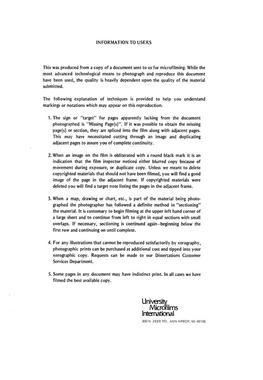| dc.contributor.author | Tabasuri, Tabiri Hasani, | en_US |
| dc.date.accessioned | 2013-08-16T12:28:25Z | |
| dc.date.available | 2013-08-16T12:28:25Z | |
| dc.date.issued | 1981 | en_US |
| dc.identifier.uri | https://hdl.handle.net/11244/4906 | |
| dc.description.abstract | During the course of the study, an adequate method of theory construction was both identified and clarified. Moreover, the Systems' mode of theory construction was selected for use in this study, mainly because of its close approximation to social movement phenomena through the use of functional, feedback and feedback loop relationships. The Systems' mode of theory construction was seen as having the most potential for producing the desired result, which was the flexibility and comprehensiveness to allow the construction of a theory which can explain anti-colonial revolutions in particular and "all" revolutions in general. | en_US |
| dc.description.abstract | The basic point of view taken in this study is that before an investigator can adequately confront such complex theoretical issues as the explanation of the causal origins of revolution, it is imperative that systematic procedures be developed for doing so. Thus the major goal of this study is theory construction; it is not the verification or testing of theory in any rigorous, experimental, or statistical sense. | en_US |
| dc.description.abstract | The major concerns in this study are (1) the development of a general theory about the causal origins of anti-colonial revolution; and (2) the development of this theory from an intensive case study of the Haitian Revolution, perhaps the first "successful, " slave revolution in modern history if not all of history. | en_US |
| dc.description.abstract | In the course of accomplishing these tasks, the following minor purposes or exploratory attempts to answer the following questions are accomplished, as well. (1) Why is it that a "successful" slave revolution occurred in Haiti and did not occur among slaves in other French, colonial possessions in the Caribbean? More specifically, why is it that a "successful" slave and anti-colonial revolution occurred in Haiti at this time (1791-1820) and not in such comparable places as the Caribbean islands of Martinique and Guadaloupe? (2) Can the theory once derived be validly generalized to other cases of anti-colonial revolution in another place and another time. For example, can the theory be generalized to the case of the Algerian Revolution of the twentieth century in North Africa? It, too, was an anti-colonial revolution in the French Colonial Empire but it occurred in North Africa in the second half of the 20th century, 1954-1978. (3) How will the theory have to be modified to better fit the cases examined above--Martinique, Guadaloupe, and Algeria--to serve as a general theory of all anti-colonial revolutions? And finally (4) to what degree can this theory be generalized to fit all types of revolutions? In addition, this study also presented some special insight on the ability of the theory to be generalized to all social movements. | en_US |
| dc.format.extent | x, 453 leaves : | en_US |
| dc.subject | Sociology, Theory and Methods. | en_US |
| dc.title | A theory of revolution and a case study of the Haitian Revolution. | en_US |
| dc.type | Thesis | en_US |
| dc.thesis.degree | Ph.D. | en_US |
| dc.thesis.degreeDiscipline | Department of Sociology | en_US |
| dc.note | Source: Dissertation Abstracts International, Volume: 42-07, Section: A, page: 3324. | en_US |
| ou.identifier | (UMI)AAI8129422 | en_US |
| ou.group | College of Arts and Sciences::Department of Sociology | |
